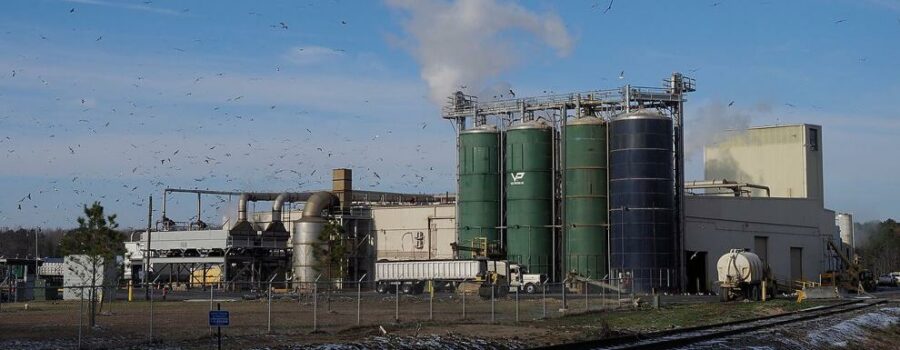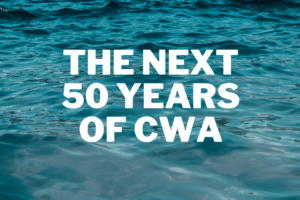‘Zombies’ on the Bay: Environmental Groups Fight for Permits that Reflect Current Discharges
By: Lilly Howard
Zombies may be all the rage on streaming services, but when it comes to pollution controls, a zombie permit is not what anyone would call entertaining.
Zombie permits, as they’re not so affectionately known, are wastewater discharge permits that the state extends administratively, without inspection and without taking into account changes in what or how much enters local waterways. Though the 1972 Clean Water Act (CWA) requires states to renew and reissue wastewater discharge permits every five years, state governments are often understaffed and don’t get around to all of the updates. Thus, the companies operate on expired permits – zombie permits – which may not reflect changes in actual discharges for 10 years or more. With Maryland underfunding its administrative staff for decades, zombie permits have become common statewide, prompting legal action and legislative solutions to try to protect waterways.
This was the case for Valley Proteins, a poultry rendering facility in Dorchester County on Maryland’s Eastern Shore that was recently acquired by Darling Ingridients Inc – the world’s leading company for turning food waste into sustainable products. The company, based in Linkwood, held the oldest zombie permit in the state, operating 15 years after their permit expired in 2006.
Valley Proteins is the largest point-source polluter in the Transquaking River watershed, and is responsible for 40 percent of the river’s nitrogen pollution, according to MDE documents. Point-source pollution comes from one specific location, and in this case the rendering facility in Linkwood is the single source. Rendering plants take animal carcasses, waste, and tissue and turn them into the building blocks of other products, including pet food and cosmetics.
For years, environmental groups and citizens complained about overwhelming discharges into the river. The owner of Higgins Mill Pond, which is an impoundment in the Transquaking River a few miles downstream from the rendering plant, testified at a virtual hearing in 2021, saying that within 24 hours of swimming in the pond, two family dogs, named Cocoa and Buddy, died from organ failure. The veterinarian attributed the death to ingesting microcystis algae, a toxin that has been known to kill dogs. Officials with Valley Proteins did not respond to emails, and their voicemail box was full.
Other residents on the pond reported large-scale fish kills and unauthorized discharges to Dorchester Citizens for Planned Growth – a nonprofit dedicated to providing a public voice on land and water use in the area. The group took these issues to MDE. From there, MDE did not take any action regarding the fish kill, but eventually sent an inspector to the facility after suspected pollution dumping and found numerous unreported chlorine discharge violations.
In 2022, Valley Proteins entered into a judicially-approved Consent Decree with MDE, the Chesapeake Bay Foundation (CBF), ShoreRivers, and Dorchester Citizens for Planned Growth. The company paid $540,000 in civil penalties to the state and contributed $135,000 to nonprofit plaintiffs for new water quality restoration work. This was one of the largest financial penalties for environmental infractions, according to the CBF Eastern Shore Director Alan Girard.
Then, MDE issued the company a new wastewater discharge permit, without adequately addressing water quality concerns, according to CBF.
Many environmental groups found this new permit insufficient, as it still won’t ensure compliance with water quality standards, according to CBF Staff Attorney Matt Stegman. CBF, Dorchester Citizens for Planned Growth, Friends of the Nanticoke River, ShoreRivers, and Wicomico Environmental Trust challenged MDE’s new permit this past February in order to hold the agency accountable and ensure more action is taken to prevent Valley Proteins from further polluting the Transquaking River watershed. Attorneys are currently engaged in court proceedings on their petition for administrative review.
The new permit doesn’t address the ongoing air pollution or the unregulated industrial waste exported from the rendering plant, according to Dorchester Citizens for Planned Growth’s website. Under the new permit, if Valley Proteins meets higher standards for ammonia, biochemical oxygen demand, and dissolved oxygen, they are allowed to increase wastewater discharge from 150,000 gallons per day to 575,000 gallons.
“The violation of all good and common sense is that the new permit gives them (Valley Proteins) the ability to quadruple their wastewater stream…We just don’t think that there’s any way the river is going to get any better if they continue with what they’ve been doing for years, which is constant overflows and constant issues,” said Fred Pomeroy, president of Dorchester Citizens for Planned Growth.
The previous total maximum daily load for the Transquaking River had allowances based on data from the nearby Chicamacomico River, which is an entirely different water body. Unlike the Chicamacomico, the Transquaking has an impoundment creating Higgins Mill Pond, which is right below Valley Proteins’ outfall. Their liquid waste sits in the pond for an average of nine days, which fuels harmful algal blooms, low oxygen dead zones, and wildlife impacts according to ShoreRivers’ website, a nonprofit dedicated to protecting and restoring waterways on the Eastern Shore. Higgins Mill Pond also has its water quality standards being compared to the flow of the river, when sometimes the pond doesn’t flow at all.
MDE did not sufficiently establish permit requirements that protect the Transquaking River water quality, in part because they used the nearby Chicamacomico River as a surrogate to model flow data on which the permit is based – even though that river doesn’t have an impoundment, according to Girard.
EPA water quality standards are defined as both establishing water quality goals for a specific water body and serving as the regulatory basis for water treatment controls and strategies. The Transquaking River watershed covers approximately 69,800 acres, while the Chicamacomico River is less than half that size, spanning only 33,017 acres, according to MDE documents. Although both rivers are classified as Use I – water contact recreation and protection of aquatic life – the lower section and tributaries of the Transquaking River are classified Use II – support of estuarine and marine aquatic life and shellfish harvesting, according to MDE’s Code of Maryland Regulations. The Transquaking watershed is more vast in acreage and in usage, making it fall under different water quality standards than the Chicamacomico.
In order to better understand standards and protect the Transquaking River, CBF, Dorchester Citizens for Planned Growth, and ShoreRivers have an 18-month contract with Earth Data for a water quality study that evaluates the flow, temperature, and environmental parameters of the river, that can help inform future permit requirements. By order of the Consent Decree, Valley Proteins is paying for the monitoring.
“We’re just trying to make sure the states and the courts look at this carefully and assure that water quality is protected,” said Girard.
In addition to this Consent Decree, lawmakers, with assistance from advocates like the attorneys at the Chesapeake Legal Alliance pushed a bill in the Maryland General Assembly that requires MDE to hire more enforcement staff and eliminate all zombie permits by the end of 2026. Across the state, hundreds of these permits were allowed to operate during the Hogan administration, which did not prioritize permit processing or inspection, according to CBF attorney Stegman. This bill empowers MDE to inspect every facility operating for over a year with an extended permit at least once every 90 days, and report annually to the Governor and General Assembly, according to the Chesapeake Legal Alliance’s website. Stegman said that the most significant part of the zombie bill is that it sets the goal to work through the backlog and requires the department to request necessary resources to get through them by 2026.
Valley Proteins is not the only such case. MDE and Maryland Office of the Attorney General filed a lawsuit in April this year against the Fleischmann’s Vinegar Company for violating Maryland’s water pollution laws at their Baltimore facility. This lawsuit came after CLA, on behalf of Blue Water Baltimore – a watchdog organization for Baltimore’s waterways – filed suit in federal court for violations of the CWA. Although the company does not have a zombie permit like Valley Proteins case, the lawsuit similarly claims that the company under-reported discharge, operated without required coverage under a stormwater permit, and failed to maintain water treatment and control systems. MDE and the Office of the Attorney General requested the court to order the company to stop pollutant discharge, start consistent compliance with permit requirements, and identify what caused the unauthorized discharges through a study of the facility infrastructure.
MDE Deputy Director of Communications Jay Apperson noted that MDE will hire 13 new compliance and enforcement inspectors by the end of this year, while prioritizing inspection at facilities with the most significant impact on public health and the environment. MDE is also implementing a screening of monthly Discharge Monitoring Report (DMR) data to identify wastewater treatment plants that are not operating at expected levels. DMRs are self-monitored results for wastewater that the National Pollution Discharge Elimination System under the EPA requires. They consist of the total monthly flow, average daily flow, concentration, frequency, quantity, and other parameters. This system helps ensure that companies like Valley Proteins can’t over-dump and under-report toxic discharge that eventually flows into the Chesapeake Bay.
Responsibly reducing the number of administratively extended permits is another priority for MDE. Since the zombie bill was passed in 2022, MDE has removed 90 such permits. MDE officials say they will continue to protect the environment and public health by eliminating administratively extended permits and issuing renewed permits with updated requirements. They also plan to hire 11 additional permit writers by the end of the year.
Governor Wes Moore’s recent budget included 43 new positions to clear the zombie permit backlog and 24 new positions to increase inspection of water treatment plants, according to the Maryland League of Conservation Voters.




